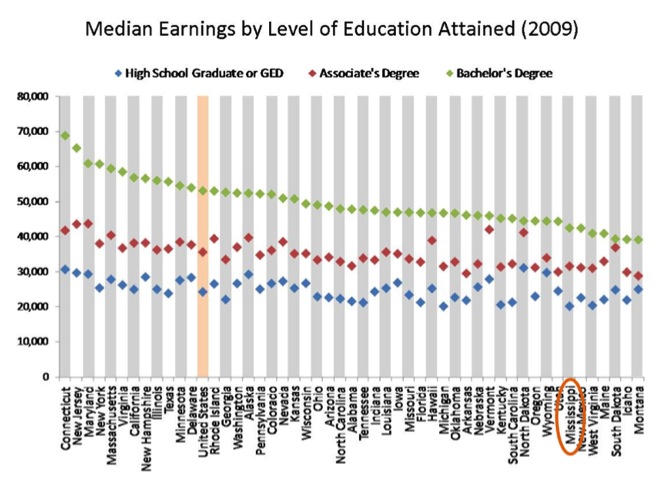WHAT ARE THE REAL RETURNS FROM POST-SECONDARY CREDENTIALS?
May 10th, 2012
Last week MEPC’s blog introduced a new tool that looks at the returns on investment adults and the state receive from increasing post-secondary degree and credential attainment among residents.
MEPC regularly recommends increasing resources for higher education, so adults have smoother, better supported pathways to success in higher education and the workforce. An analysis by the Center on Law and Social Policy (CLASP) affirms the importance of bolstering these investments and shows the value to Mississippians receiving the credentials and the state overall.
Let’s start on the individual level. The chart below compares the difference in earnings between adults with a high school degree, associate’s degree and bachelor’s degree. It is not surprising that Mississippi falls below average for earnings for adults with a bachelor’s degree. However, what the chart also shows is substantial space between Mississippi’s adults with a high school degree, associate’s degree and bachelor’s degree. The space between the earnings by educational attainment reveals that Mississippi workers experience notable wage increases through pursuing education.
Higher education continues to be a pathway for increasing economic security of individuals. However, gains from increasing credential attainment don’t just affect the individual. Increasing credential attainment also benefits families, employers and the state’s revenue generation.
Tomorrow’s post will compare the returns in personal and state income Mississippi experiences from increasing college credential attainment to the returns in other states across the U.S.
Author: Sarah Welker, Policy AnalystSource: Center on Law and Social Policy. The Credential Differential: The Public Return to Increasing Postsecondary Credential Attainment. Webinar on April 26, 2012.






